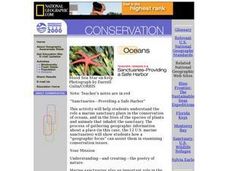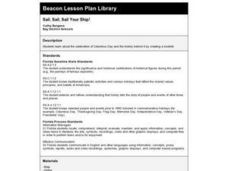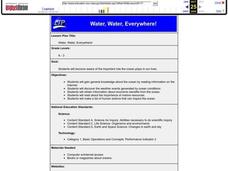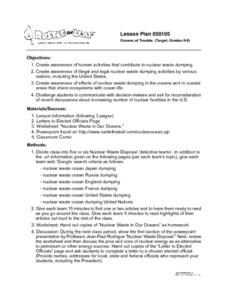Curated OER
Exploiting Antarctica
Students read the story and diary "Lizzie's diaries from Antarctica and Antarctica" to get massive clean-up. Students discuss their knowledge of life in Antarctica and raise the fact of the Amundsen-Scott South Pole Station and its...
Curated OER
Shark Encounter
Sixth graders identify fact and fiction about sharks. In this investigative lesson students graph results of a shark survey and label parts of a shark.
Curated OER
How Harmful Is It?
Students complete a form that requires them to make decisions about how severely different types of marine debris affect people, animals, vessels, communities. Results are totaled and analyzed to determine which types of marine debris...
Curated OER
Sanctuaries-Providing a Safe Harbor
Young scholars investigate the role of marine sanctuaries in the conservation of oceans and the lives of plant and animal species that live there. They write poetry to exhibit what they learn.
Curated OER
Gray Whales on the Move
Young scholars study whale migration and their natural history. In this migration instructional activity students plot whale migration on a map and describe their ecosystems.
Curated OER
Just Jelly
Students identify common gelatinous zooplankton in the Canada Basin and their ecological role. They compare and contrast feeding strategies of at least three different types of gelatinous zooplankton.
Curated OER
Lights in the Deep
Learners describe, compare, and contrast bioluminescence, fluorescence, phosphorescence, and chemiluminescence. They explain the role of three major components of bioluminescent systems. They ex
Curated OER
A Tough Neighborhood
Students describe at least three attributes of the deep ocean physical environment that are radically different from ocean habitats near the sea surface.Students explain at least three morphological or physiological adapt
Ocean Explorer
Looking for Clues
Upper graders become "shipwreck detectives" by studying the debris field from a shipwreck in the Aegean Sea which took place in the 700s. A website is accessed that gives specific information about the debris field, and pairs of...
Curated OER
Now You See Me, Now You Don't
Bioluminescence fascinates most upper elementary scientists. Display images of different glowing deep-sea organisms and discuss their environment. Young biologists then experiment with images and different colors of filtered light. In...
Curated OER
The Eyes Have It!
Reading essays about deep-sea expeditions open this lesson on crustacean vision. Marine biology explorers study the compound eye and then complete a worksheet in response to all they have discovered. Although the lesson doesn't offer an...
Curated OER
Major American Water Routes
Sixth graders locate and identify the major bodies of water and waterways in the United States. Through a simulation activity, they describe how early explorers would have described their surroundings. Working in groups, they create...
Curated OER
Who Where They?
Middle schoolers associate explorers with specific discoveries. They apply research skills to inquire about the explorers. Students switch roles with the instructor for the class to demonstrate what they have learned.
Curated OER
Sail, Sail, Sail Your Ship!
Students listen to the book, Columbus Day, by Paul Showers and discuss the historical significance of Christopher Columbus. They create Columbus Day booklets, sing a Christopher Columbus song, and develop graphic organizers.
Curated OER
Ponce de Leon
Fifth graders explain that the discoveries of Ponce de Leon were important, both in and of themselves and to the destinies of Europeans and Native Americans. They write an essay highlighting two of his important discoveries.
Curated OER
Mapping and Personifying Nations
Eleventh graders analyze the geography, actions, and relationships of countries involved in World War II. They create a map of Europe, Northern Africa, and the Pacific, and analyze and evaluate their self-made map of Europe and the...
Curated OER
Going to Extremes
Students recognize that our ability to explore the extremes of the ocean is directly related to the technology of remote sensing. Students will recognize the deep submergence vehicle, Alvin, and the advanced sensors on board as tools for...
Curated OER
Current Interactions
Students design an experiment to see how wind, temperature, and salinity work together to influence ocean currents and present it in a report format. They explain to their classmates how experiment findings relate to ocean currents.
Curated OER
Water, Water, Everywhere!
Students become aware of the important role the ocean plays in our lives. Students will gain general knowledge about the ocean by reading information on the Internet. They discover the weather events generated by ocean conditions.
Curated OER
If I Can't See It, How Do I Know It's There?
Students build a model ocean using a variety of materials representing the various levels of the ocean. They collect data about the ocean floor in a partner activity. They practice working with topographical mapping grids.
Curated OER
Science Lesson #2
Fourth graders explore and experiment with objects that float to see if they float differently in salt water or fresh water. After the experiment, they write a paragraph in their science journal explaining how fresh water and ocean water...
Curated OER
Ellis Island
Students explore immigration. In this U.S. history immigration lesson, students complete and read a mini-book about Ellis Island.
Curated OER
Oceans of Trouble
Pupils investigate the illegal and legal nuclear waste dumping activities by various nations, including the United States. The effects of nuclear waste dumping in oceans and in coastal areas that share ecosystems with ocean life is...
Other popular searches
- Ocean Exploration Tools
- Pacific Ocean Exploration
- Ocean Exploration Food Web
- Ocean Exploration Technology
- Bill Nye Ocean Exploration
- Ocean Exploration Time Lines
- Human Ocean Exploration
- Ocean Exploration Time Lime
- Bill Nye: Ocean Exploration
- Ocean Exploration Expeditions
- Ocean Exploration Timelime

























